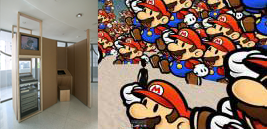As part of the Digital Curation Institute’s Lecture Series 2015, on February 23 guest speaker Prof. Jon Ippolito is speaking about Digital Preservation and the Search for Renewable Culture.

Abstract: Dead links, delaminated CDs, and demagnetized hard drives are all signs of a cultural heritage system in peril from technological obsolescence. Yet even if we managed to save our bits for eternity in the Cloud, that’s no guarantee that posterity would be able to reconstruct their original software and hardware environments—and thus the experiences and meanings these bits conveyed for us.
Fortunately, more adaptable preservation paradigms are waiting to be discovered far outside the walls of archives and museums. From the Amazon rainforest to videogame forums, creative culture is being re-performed rather than stored. While professional conservators and archivists wring their hands over digital works decaying in climate-controlled warehouses and libraries, a global community of amateurs has been reanimating extinct artworks, video games, and even spacecraft.
Drawing on themes from his 2014 book Re-collection (http://re-collection.net) co-authored with Richard Rinehart, Jon Ippolito examines how a few intrepid institutions have begun to apply the lessons of such crowdsourced preservation to everything from emulation testbeds to 3D scanathons. Accompanying the talk will be a dialogue with moderator Prof. Costis Dallas and the audience on how techniques from performative culture can help rescue digital culture from the throes of technological obsolescence and institutional amnesia.

Biography: Jon Ippolito is Professor of New Media at the University of Maine, where he co-directs the Still Water lab and the Digital Curation program. Re-collection, his most recent book on the threat that technological obsolescence presents for digital culture, was published in 2014 by MIT Press.
Jon Ippolito hopes building networks will help keep digital culture alive and kicking–but he has his hands full in today’s climate of unfettered media monopolies, accelerated obsolescence, and looming co-optation by academia. He is the digital doyen of The Variable Media Network, an international consortium of museums and archives that devises medium-independent strategies to preserve new media art. As grand vizier of The Open Art Network, Ippolito works with a growing number of prominent digital artists to promote an open architecture for the Internet and digital media. As chief constable of the Still Water lab at the University of Maine, he works with Co-director Joline Blais to enforce an expansive definition of networked art in the academia and the art world, as argued in their 2006 book At the Edge of Art. The recipient of Tiffany, Lannan, and American Foundation awards, he has exhibited artwork with collaborative teammates Janet Cohen and Keith Frank at the Walker Art Center, ZKM/Center for Art and Media Karlsruhe, Harvard’s Carpenter Center, and the Yale Art and Architecture Gallery. As Associate Curator of Media Arts at the Guggenheim Museum, he has curated Virtual Reality: An Emerging Medium and, with John G. Hanhardt, The Worlds of Nam June Paik. Ippolito’s critical writing has appeared in periodicals such as the Art Journal, Artforum, Flash Art, the Washington Post, and in his regular column for ArtByte magazine. He and his work have been cited in a dozen New York Times and a dozen Wired articles, but that didn’t stop his tenure committee from asking why he hadn’t published in more academic journals. His book Re-collection, co-authored with Richard Rinehart, argues that digital heritage of the last 30 years will be lost to history without a revolutionary approach to preserving culture.

The lecture takes place at 12:00-13:30 on Monday, February 23, in room 728 (7th floor) at the iSchool, Bissell Building, 140 St. George Street.

